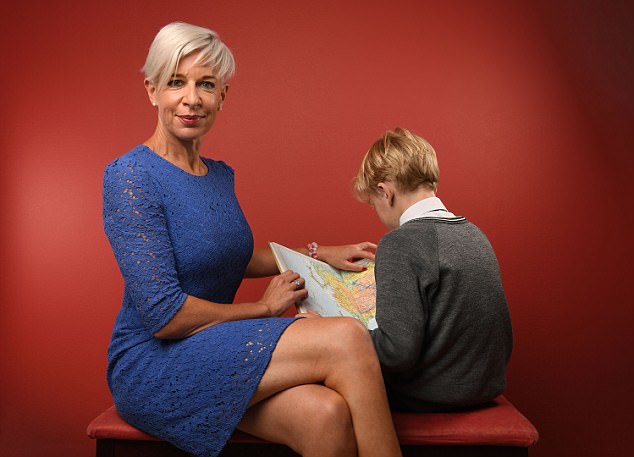Trying to keep up with the crumpled permission slips and teachers’ notes that come home from school in the bottom of my kids’ bags is hard enough.
Will I bake a cake for the Macmillan coffee morning? Can my girls go on a netball tour for the weekend? Do I give permission for my son to study sex education – at eight?
Yes. Yes. Oh golly, if he must.

It’s a strange idea to fill my son up with medicines when there is nothing wrong with him, especially when we are talking about the flu, writes Katie Hopkins(pictured with Max)
But it is much harder when you aren’t sure what the right answer is, or if your answer is not the same as everyone else’s.
When Max brought home a form from school a few weeks back requesting permission to give him a flu vaccination, my immediate reaction was no.
In Britain, most primary schoolchildren are offered the drug – it’s a nasal spray rather than a jab these days – for free, which we are told protects them from catching the virus. It also prevents them from spreading it.
But Max is one of those annoyingly lucky kids: born fit and healthy, never had a same-day doctor’s appointment in his life, plays football four times a week.
It’s a strange idea to fill him up with medicines when there is nothing wrong with him, especially when we are talking about the flu.
My objections were instinctual: to my son being given medicine by the state, just because everyone is supposed to have it, to being told what’s best by bureaucrats.
I’m not anti-vaccine. My three children are all up-to-date with all their jabs. I could not be more grateful to the NHS for the HPV vaccinations to protect both my daughters from cervical cancer.
But, after my brain surgery to sort out my epilepsy and a subsequent life-threatening infection, I realized the safest way to live is to stay out of hospital or avoid intervention if you possibly can.
And on the whole, doctors agree.
Vaccinating against a flu you haven’t caught yet seems to be the opposite of this. So, I set out to speak to Public Health England, GPs, NHS staff and other mums and dads to see what they had to say.
Perhaps my strongest argument of all is that I don’t mind if Max gets the flu this winter. He’ll probably be off school for a day and then crack on as normal.
But you could argue that if Max gets it, he might give it to another child who is not so healthy, one who is high-risk with asthma – so social responsibility dictates you should vaccinate your low-risk child for the benefit of high-risk others.
But honestly, I am just not that good a person. My son and his health will always take priority over my health, and the health of others outside of my family. So I returned the form, refusing permission.
Sure enough, I received another form. It was assumed I had got confused and ticked the wrong box. And I wondered. How much pressure are parents under to say yes to these vaccines?
I am known for being irritatingly opinionated and self-assured. I really don’t care what other parents think about me.
But I have observed the ‘Mumsnet Mafia’ in operation at the school gate.
‘Good mums’, who are pro flu-vax, say ‘bad mums’ should be banned from school until their kids have the jab. After I asked for your thoughts, my email inbox was filled with replies from concerned parents on both sides of the debate.
One mum emailed me to tell how when she raised her concerns about vaccinating her healthy child, the school nurse said: ‘Not giving your child flu spray because they never get ill is like not having a smoke alarm in your house because you’ve never had a fire. It might happen, so you are best to cover yourself.’
Pardon me? Is the flu really comparable to a house fire?
I also heard from parents of high-risk children with asthma or diabetes who are more likely to suffer severe complications of flu, such as pneumonia. They could not understand how I could be so selfish.
A GP emailed to explain that mass immunisation is a form of herd cover: you treat the whole herd to keep the whole herd safe.
And I take his point. Except my son is not an animal, and I am not a sheep. This GP acknowledged that the vaccination dished out by the Department of Health is ‘more best guesswork than anything else’.
I asked Dr Mary Ramsay, head of immunisation at Public Health England, whether this was fair. She said: ‘The World Health Organisation [WHO] reviews the global situation each year and recommends which three flu strains should go in the trivalent vaccine to be manufactured for the following season.
‘The WHO has to make a decision on which strains of flu to protect against, before flu starts circulating several months later the following season, to allow time for the vaccine to be manufactured.’ So that would be a qualified yes about it all being ‘best guesswork’.
Dr Ramsay adds that last year it was 65.8 per cent effective in stopping vaccinated children catching the strain of flu they were vaccinated against.
My maths calculates that this means close to one in four of those immunised could still get the strain of flu they were vaccinated against. And this doesn’t account for any flu strains not in the vaccine.
I suspect we all know someone over 65 who refuses point-blank to go anywhere near the flu jab. Many swear it caused them to feel terrible for two weeks. I have emails from people who say their muscles ached for ten days.

Twitter spat: Ellie Cannon had to correct Calvin Harris, here with Taylor Swift, over his flu jab claims
Den, 67, in Bridport says: ‘I’d rather risk catching the real flu and deal with it the hard way.’ It’s not just my son’s age group or the over-65s who are targeted. One small business owner says he offers vaccinations because sick days are a genuine threat to his business.
He is right, of course; I am not an understanding employer when it comes to staff calling in sick. But I wonder what happens if you opt out but then need to take time off if you get the flu. Now that’s got to be a really awkward call to make.
There are other forms of pressure, too. One person told me: ‘I work for the NHS, in admin, with little patient contact. It is not mandatory but I’m made to feel like a naughty child if I refuse.’
You can understand her irritation. And it’s a consistent theme, from young to old, mums to workers: it’s not that the jab is mandatory; the problem is the stigma if you opt out.
Dr. Ramsay says: ‘Vaccinating your child is the responsible thing to do.’ Which can only mean that in the eyes of Public Health England, I am an irresponsible parent?
And that’s before you start to layer on financial incentives to immunize. A doctor from the Midlands called me in confidence to say he hates the system which is linked to rewards.
He’s referring to the fact that partners in doctors’ surgeries receive financial incentives according to the percentage of their patient population they immunize. I wonder just how comfortable the relationship between state, big finance and big pharma is.
Another NHS worker, Luke, reflects: ‘I work in emergency surgery and am exposed to individuals fighting for their lives.
‘I have a flu jab to protect these helpless souls from myself.’ But there is a lack of evidence to support vaccinating the masses with substances that have a poor record of efficacy.
I fully condone the routine use of vaccines in high-risk groups. But should we routinely hand out these medications to individuals outside the healthcare industry or high-risk categories?
In my opinion, no. It’s an opinion I am increasingly willing to share.
1,000 in hospital, 133 dead… that’s why we do this, Katie
By Dr. Ellie Cannon
I agree with Katie that as a parent she has the right to choose to vaccinate or not. But the agreement, as far as I am concerned, ends there. For a start, it’s a dangerous misconception that flu is like a bad cold.
Last winter, more than 1,000 Britons were in intensive care due to the virus. And 133 died.
Children are chosen for vaccination not only because they are super-spreaders of the virus but also because they are known to be high-risk: children aged under five are more likely to be hospitalized due to flu than any other age group.
The notion that a hardy child will be fine and doesn’t need to opt for preventative measures is a further misunderstanding. It is something I have heard anti-flu-vaccination parents say many times.

Last winter, more than 1,000 Britons were in intensive care due to the flu virus. And 133 died
Whether or not you contract a virus is not simply due to your strength and physical resilience.
It is also a numbers game where you contract an infection due to high circulating numbers of a virus, and the bad luck of being in the wrong place at the wrong time.
My son Jude was as Katie describes Max – a fit-as-a-fiddle eight-year-old – when he got meningitis. It had little to do with robustness, more to do with circulating viruses and luck.
I do understand the ‘why fix what isn’t broken’ argument. But one could put that argument to all preventative health care and therefore miss out on the vast benefits it brings. Kids are vaccinated against a whole range of long-forgotten diseases, as well as those they are more likely to catch.
Part of the resistance is because vaccinations fall foul of a huge number of spurious claims of online groups and pseudo health experts.
Only last week I was embroiled in a Twitter spat with the musician Calvin Harris – with 12.5 million Twitter followers compared to my modest 15,000 – who alleged flu vaccines contain toxic mercury.
This is another misconception, driven by a misunderstanding of the science. Some flu vaccines contain thimerosal preservative, a non-toxic compound related to mercury that has been proven to harmlessly pass through the body. The children’s flu nasal spray we use today doesn’t contain it.
I admire Katie’s honesty about choosing what is best for her child above other people.
Sadly, research does show it to be a prevailing attitude in relation to the flu vaccine. Parents should be allowed to give informed consent for all treatment. I am afraid that we are not always getting the informed part right.
If you know someone who might like this, please click “Share!”

